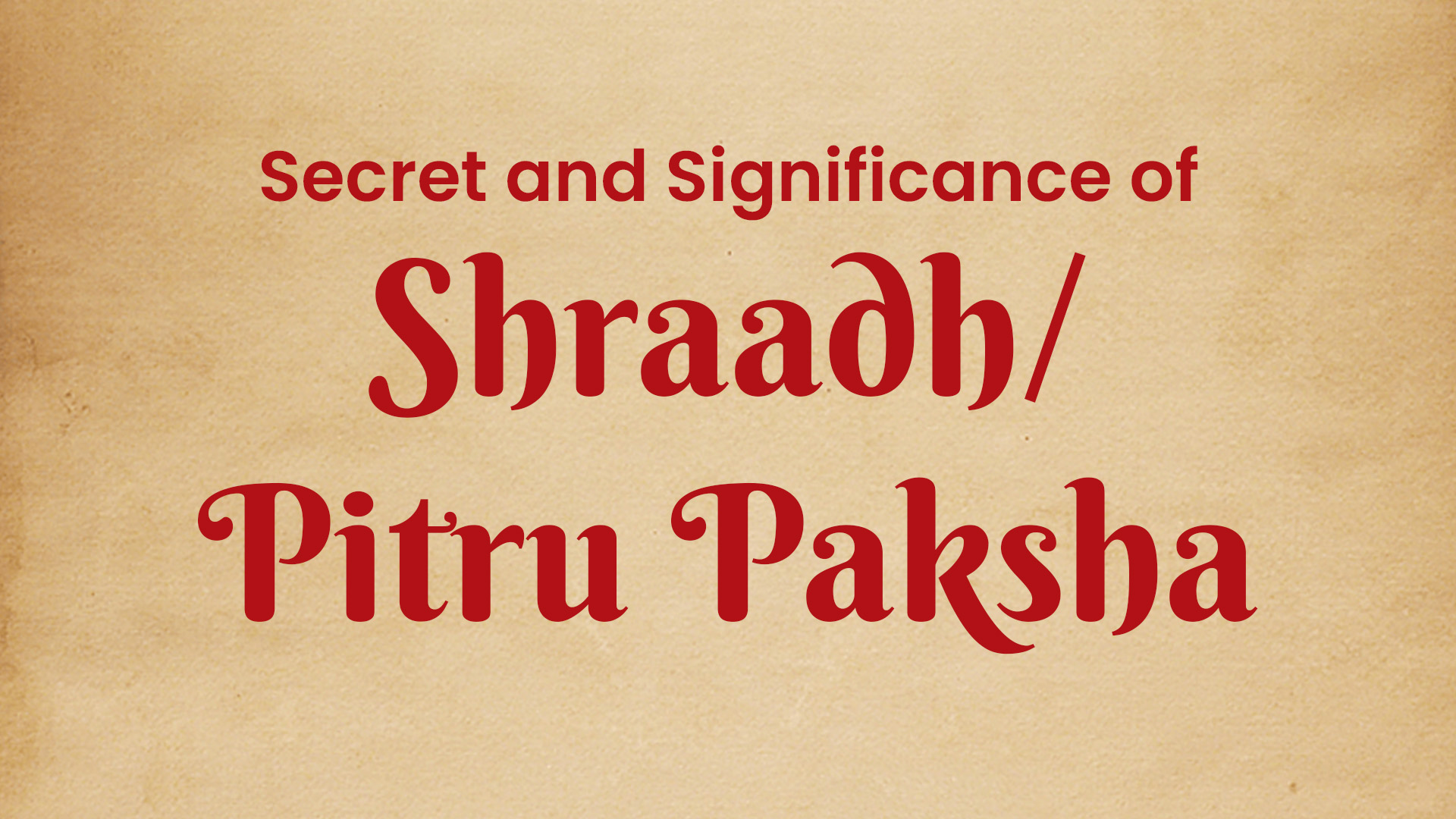Namaskar,
The Vedic Sanatan tradition believes that our life is driven by numerous visible and invisible forces. In order to repay this debt, we should all strive to be diligent. The Vishnu Dharmottar Purana states:
“देवानाम् च पितृणाम् च ऋषीणाम् च तथा नर: ।
ऋणवान् जायते यस्मात् तन्मोक्षे प्रयतेत सदा ॥
– विष्णु धर्मोत्तर पुराण
There are three debts upon all human beings: the debt to the Gods, the debt to the ancestors, and the debt to the sages. We should always strive to repay these debts.”
The time to repay the debt to our ancestors is the Pitru Paksha, also known as the Ancestral Offering period, Shraddha Paksha. The word “Pitru” can be understood as our forefathers, who are no longer in physical form. They are our ancestors or predecessors. They exist as Pitrus and have their own realm called Pitru Loka. The oldest scripture, the Rigveda, clearly states this concept.
नक्षत्रोभि: पितरो द्यामपिंशन् ।
– ऋग्वेद
When we decode the verse, it becomes clear that it is referring to what we call space or Antariksha. In the Gayatri Mantra, what is referred to as “bhuvah” is the space realm or the Pitru Loka, which is the realm of the ancestors. It is through the ancestors that the sky is adorned with stars. They are responsible for the darkness of the night and the light of the day.
The Markandeya Purana also clearly states that Brahma first created four categories: gods, demons, ancestors (Pitrus), and humans. Each of these has their own realms.
Our ancient scientist sages have researched and established that the Pitru Loka becomes active during the dark fortnight of the Bhadrapada month. There is a unique combination in the cosmos during the dark fortnight of Bhadrapada. On the day of Bhadrapada Purnima, the moon is in the Meena (Pisces) sign in the Uttara Bhadrapada Nakshatra, and the sun is in the Kanya (Virgo) sign in the Uttara Phalguni Nakshatra.
This combination of the sun and moon activates the Pitru Loka in the cosmos. During these 15 days, if we do nothing for our ancestors, we can make progress. This is clearly stated in the Vajasaneyi Samhita.
आधत्त पितरो गर्भ कुमारम् पुष्करस्त्रजम् ।
यथेह पुरुषोऽ सत् ॥
– वाजसनेयी संहिता
So, one thing has been determined we need to observe the Bhadrapada Krishna Paksha for our ancestors, which is why this fortnight is called Pitru Paksha or Shraddha Paksha. When we perform actions for our ancestors, it is called “Shraddha Karma”. That is why this time or fortnight is also called Shraddha Paksha.
The Brahma Purana provides a verse for this:
“देश काल च पात्रे च श्रद्धया विधिना च यत् ।
पितृन् उदिश्य विप्रेभ्यो दत्तम् श्राद्धम् उदाहतम् ॥
– ब्रह्म पुराण
according to the country, time, and individual involved, the offering given to the Brahmins or priests for the purpose of ancestors is called “Shraddha”.
If we decode the verse, it becomes clear that according to our circumstances, our intention should be to perform the welfare of our ancestors through Shraddha with proper faith. We should engage in such actions that benefit wise and knowledgeable individuals. But we often do the opposite – without any faith, we make and offer kheer and poori to crows or keep food on the terrace. Moreover, we go even further and feed those who belong to the Brahmin caste. This is our interpretation of Shraddha. People of the Brahmin caste recite the verse, and we feed them and make a small donation. However, here we need to understand the meaning of the verse. The meaning of “Vipra” or “Dvija” in the verse is not someone who is a Brahmin by birth. No one is born as a Brahmin.
The Skanda Purana clearly states:
“जन्मना जायते शूद्र: संस्कारात् द्विज उच्चते ।
– स्कंद पुराण
A person becomes a Dvija or Brahmin through their upbringing, not by birth.
The Brahmins are the well-behaved and cultured individuals around us, who possess good manners. They are the ones who help others, are research-oriented, and fulfill their duties with honesty. These are the true Brahmins.
Even Lord Krishna himself stated this in the Bhagavad Gita:
चातुर्वण्यम् भया सृष्टम् गुण कर्म विभागश:।
– भगवद् गीता
The four varnas (castes) were created by Me according to the divisions of quality and work.
– Bhagavad Gita
So, we need to do something for the same social group.
In this Pitru Paksha, the most essential and mandatory condition is “Shraddha” or reverence. Clear indications can be found in the scripture of etymology, Nirukta Granth:
श्रद्धयाम् इदम् श्राद्धम् ।
– निरुक्त ग्रंथ
Meaning, the actions performed with reverence for the sake of the ancestors are the true essence of Shraddha.”
Now the question arises, is it sufficient to only offer food? And the answer is no. Whom to feed comes last in priority.
The scriptures clearly state that the primary aspect is to offer donations with faith. Monetary donations with faith are considered essential. For your reference, I am providing a verse:
Yajnavalkya Smriti says:
श्राद्धम् नाम् द्रव्यस्य प्रेत उद्देशेन श्रद्धया त्याग:।
– याज्ञवल्क्य स्मृति
Shraddha is the act of relinquishing one’s possessions with the intention of benefiting the departed souls.
– Yajnavalkya Smriti
Shraddha Kalpataru says:
एतेन पितृन् उद्दिश्य द्रव्योत्यागो श्राद्धस्वरूपम् प्रधानम् ।
– श्राद्ध कल्पतरु
By offering donations with the intention of benefiting the ancestors, the act of relinquishing possessions becomes the essence of Shraddha.
– Shraddha Kalpataru
This explains the external aspect of Shraaddha. However, if we look at it from a spiritual perspective, the word “Shraddha” is derived from “Shraddha” itself, and “Shraddha” is formed by combining “Sat” (truth) and “Dha” (to uphold).
We should walk on the path of truth in our lives. This is true Shraddha. And if we can do this even for the 15 days of the Bhadrapada Krishna Paksha, then that is the true Shraddha.
Now, moving on to the next question: who can perform Shraddha and for whom? The scriptures say that any individual can perform Shraddha for any ancestor. Even women can perform Shraddha. A disciple can perform Shraddha for their guru. Relatives can also perform Shraddha for their family members. This is clearly stated in the Garuda Purana:
पुत्राभावे वधु कुर्यात् भार्याभावे च सोदन: ।
शिष्यो वा ब्राह्मण: सपिण्डो वा समाचरेत् ॥
– गरुड़ पुराण
If there is no son, the wife can perform Shraddha. If there is no wife, the disciple or Brahmin can perform Shraddha with Pinda.
– Garuda Purana
May the divine grant us the ability to perform the true Shraddha for our ancestors in this Pitru Paksha, walking on the path of truth. With this prayer, I will conclude my article.
Shubham Bhavatu.







